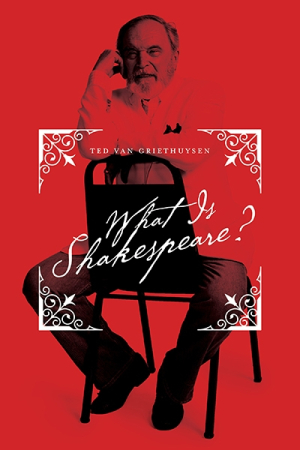What Is Shakespeare?
What Is Shakespeare? gathers varied and fascinating material related to Shakespeare’s plays.
Ted van Griethuysen’s thoughtful analytical text What Is Shakespeare? concentrates on the performance and poetry of Shakespeare’s best known plays.
Veteran actor van Grietheysen argues that theater is “history, and it is discovery.” His book splits its commentary between studying and summarizing past approaches to Shakespeare, complemented by personal realizations attained from observing and performing Shakespeare’s plays. Its charming narration balances deep, authoritative knowledge of Shakespeare with a humble spirit.
Intriguing as it seeks balance between two major elements of Shakespeare’s plays—poetic drama, “which has its own form and rules;” and the need for actors to be “convincingly and unquestionably realistic”—the book argues that both responsibilities are the same, despite their seeming differences. Chapters are full of examples of how these aspects might be incorporated into a performance.
Character analysis is central to the text, which addresses Romeo, Hamlet, King Lear, Jacques in As You Like It, and Prospero in The Tempest. The latter is seized upon as an opportunity to show how knowledge and experience can affect the way that an actor plays a role and the differences in meaning that can result. It is convincing in arguing that Romeo and Juliet be played not as mere teenagers, but as “incipient adults.”
An analysis of Shylock in The Merchant of Venice uses the character’s own words—“I am not well”—to cast him as someone who realizes he’s gone over the edge of sanity, but who cannot help himself. Lear, too, is said to doubt his own sanity—proven by a line in the play when the character says, “My wits begin to turn.” The text argues, with conviction, that this recognition of their own flaws makes these characters real and memorable.
Just as enlightening are examples and discussions of the impact of a single misplaced pause or emphasized word. The book includes thoughts on stagecraft, gender roles in Shakespeare, and opinions of well-known actors’ attempts to play famous roles: John Gielgud did well as Prospero; Laurence Olivier, playing Hamlet, faltered. An argument that Edward de Vere was the true author of some of Shakespeare’s plays is refuted with a few telling comparisons.
The book’s many bold statements are backed up by convincing explanations. The monster of Shakespeare’s Hamlet is explored at length, but is first summarized in a quote by Eli Siegel: “Hamlet could not revenge his father because he didn’t care for his father enough.” Such heady topics are leavened with personal photographs and notes, including descriptions of how van Griethuysen met his wife, a fellow actor.
Quotes are used to explain and illustrate points, as with a statement summarizing US Poet Laureate Tracy K. Smith’s feelings about poetry: “poetry is a shortcut to honest conversation.” Later, invoking Eli Siegel’s philosophy of aesthetic realism, T.S. Eliot’s “The Love Song of J. Alfred Prufrock” is compared to segments from Shakespeare’s Hamlet and Macbeth in interesting ways.
Full of fascinating material related to Shakespeare’s plays, What Is Shakespeare? is an useful addition to Shakespeare scholarship.
Reviewed by
Peter Dabbene
Disclosure: This article is not an endorsement, but a review. The publisher of this book provided free copies of the book and paid a small fee to have their book reviewed by a professional reviewer. Foreword Reviews and Clarion Reviews make no guarantee that the publisher will receive a positive review. Foreword Magazine, Inc. is disclosing this in accordance with the Federal Trade Commission’s 16 CFR, Part 255.

